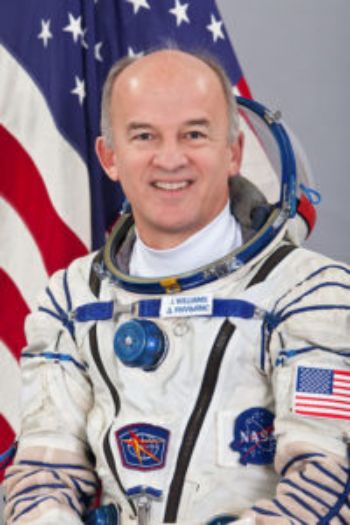
The psalmist writes, “The heavens declare the glory of God, and the sky proclaims the work of His hands,” but Astronaut Jeff Williams surprisingly is fascinated by the beauty of the earth, which he finds just as compelling.
“When I look out the window and I see this (handiwork), all of the elements are what you would imagine you would see with a creative work by an infinite God,” Col. Williams told students attending a chapel service last week at Southern Seminary. “You see the design, you see the beauty, you see the purpose, you see all of those elements, you see order in all the details.”
Yet, the subject of his camera—with a high-powered lens that appeared to be as long as his arm when it floated up by his side during the NASA downlink—often is not distant constellations and galaxies, as you’d imagine. No, chances are, he’s snapping one of those astonishing photographs of his home planet. In addition to Earth’s topographical features, he’s captured weather fronts, sunrises and sunsets from space, the aurora over the North and South poles, illusion clouds and other captivating wonders.
“When you look down at the planet, you see this marvelous, unique place that we call earth—uniquely designed, uniquely purposed, and a place that is provisioned and ordered to sustain life,” Williams said. “Every astronaut who comes up here always ends up putting the focus back on earth, even though we can see so far (into space) and see the vastness of the galaxies beyond.”
One starry night months ago, I pointed out to my son and my nephew the International Space Station, soaring 250 miles above our heads, as it streaked across the night sky. Travelling at a mind-staggering 17,500 miles per hour, the space station orbits the earth in only 90 minutes. Observers must know the direction and the precise minute to scan the sky, for the spaceship flashes across the starry expanse in 4 to 7 seconds, before disappearing again over the horizon.
As we strained our eyes heavenward to see the tiny, silverish dot, which looks very much like a star, save for its blinking at regular intervals, Williams’ camera perhaps was focused back at us. With an astonishing view that only a miniscule fraction have had an opportunity to experience, he—perhaps more than any other human being—can relate to the psalmist’s perspective, “(W)hat is man that thou art mindful of him, and the son of man that thou dost care for him?”
Looking out the space station’s small window at Earth is one thing, but “it’s quite another thing” to venture outside on a spacewalk, Williams remarked. “� (Y)ou can see through that full-faced visor, not only the vastness and the majesty of the globe itself, but deep out into space,” he said. “It just deepens a comprehension, the observation of what we know through Scripture about the amazing creative work of God. It’s an incredibly humbling experience.”
When he returns today, Sept. 6., Williams will have spent more time in space than any American—534 days to be exact. The retired Army colonel has been a crew member on four space missions, three to the International Space Station. He has been away for 172 days this time. So, what does he miss most when he’s in space? Not hamburgers or barbecue. Not football or basketball. Not television or movies. Nope, what he misses is his family.
“Family is what I miss the most,” the grandfather of four told Seminary President Al Mohler. “That’s centered around relationships, our closest relations, and as believers we understand how central relationship is to the human experience.”
“Facinating,” as Spock would say. In a 15-minute interview, the Wisconsin native had underscored for us the two fundamental aspects of the Christian faith: fostering a vertical relationship with our mighty Creator who loves us, and maintaining a healthy horizontal relationship with family and all humanity, with whom we are to share His love. This, not from a theologian or evangelist, but by a military officer and astronaut.
As NASA’s transmission began to break up as the space station hurled past Spain toward the other side of the globe, Col. Williams offered an “out-of-this-world” testimonial that in whatever calling or vocation we find ourselves, we can give witness to the glory of our amazing God who created the heavens and earth.
Todd Deaton